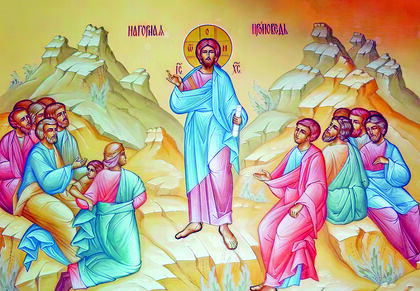The spiritual evening in November continued the presentation of the Beatitudes and took place, as usual, on the monastery’s YouTube channel.

The first four Beatitudes are more practical for us, more workable, and they show us how to repair the fall and how to heal our heart and unite ourselves with God. The Beatitudes are a ladder from earth to heaven and, likewise, an invitation from the Lord to unite ourselves with Him. Although they are paradoxical for the worldly logic of self-love by which we operate, they are therapeutic for our fall. But to make a step toward their fulfillment, we need immense trust in God. Yet, once we’ve made this step, their internal workings will be revealed to us. At the same time, the Beatitudes are an invitation to synergy with God, because they cannot be fulfilled without His help.
The third Beatitude says: “Blessed are the meek, for they shall inherit the earth.” Through the words “inherit the earth,” the Lord wants to say that the meek will be received into His Kingdom and will taste of its blessings here and of the glory of heavenly Canaan afterwards. The holy fathers say about this Beatitude: “The meek are not those who never get angry, for such people are unfeeling and apathic, but rather those who have the capacity to get angry but control it, getting angry only when necessary” (Blessed Theophylact of Bulgaria). The most perfect definition of meekness is given by Saint John of the Ladder: “Meekness is an unchangeable state of mind, which remains the same in honor and dishonor. Meekness consists in praying calmly and sincerely for a troublesome neighbor. Meekness is a rock overlooking the sea of irritability, which breaks all the waves that dash against it yet remains completely unmoved.” If all the Beatitudes contain a paradox, in the third Beatitude the paradox is the fact that we strengthen ourselves, we achieve self-mastery, becoming strong as rock, through something so delicate as meekness, which we obtain through tears.
The fourth Beatitude urges us: “Blessed are those who hunger and thirst after righteousness, for they shall be filled.” The Lord invites us to be like Him. Just as He hungered and thirsted for our salvation, for He said, “My food is to do the will of My Father, Who send Me” (cf. John 4:34), likewise He wants us engaged in the fulfillment of good works.
“Blessed are the merciful, for they shall obtain mercy.” Saint John Chrysostom says about this Beatitude: “In my estimation, the Lord speaks here not only of those who give charity with money, but also of those who give charity with their works. For charity is of many varieties, and this commandment is all-encompassing.”
“Blessed are the pure in heart, for they shall see God.” In a guide from Cambridge for universities, we seek purity described as “a virtue distinctive of Christianity, which is not featured in the teaching of Socrates or the system of Aristotle.” Saint Gregory of Nyssa shows us what purity of heart entails, that which brings about vision of God: “The Lord does not say that blessedness is to know something about God, but to have God dwelling within. He says, ‘Blessed are the pure in heart, for they shall see God.’ But I think that God will not exhibit Himself on a display before the one whose soul’s eyes are pure, but the majesty of the saying helps us understand what the Logos says elsewhere in a more perfect form, saying, ‘the Kingdom of God is within you’ (Luke 17:21). From here we learn that the one who has cleansed his heart from all creation and impassioned feeling, that one sees in his own beauty the image of the divine nature.”
“Blessed are the peacemakers, for they shall be called sons of God.” Again, Saint Gregory of Nyssa describes peacemakers and explains this Beatitude: “The peacemaker is the one who gives peace to others, yet he could not share it with others if he didn’t have it himself.”
“Blessed are those who are persecuted for righteousness’ sake, for theirs is the kingdom of heaven.” Saint Gregory of Nyssa teaches us the value of persecution: “Truly blessed is the one who draws benefit from his enemy as one who propels him toward virtue.” We have an example of someone who fulfilled this Beatitude in Saint Ignatius the God-Bearer, who in the year 107 wrote to the Romans to not intercede for him to be saved from martyrdom: “Allow me to be a follower of the Passion of my God! If someone has Him within, may that one consider my desire and have mercy on me, knowing the things that press on me.”
And also the final Beatitude, in which the Lord refers to the blessedness of those who suffer persecution for the faith: “Blessed are you when they revile and persecute you, and say all kinds of evil against you, falsely for My sake.” And finally the entreaty: “Rejoice and be exceedingly glad…”.
